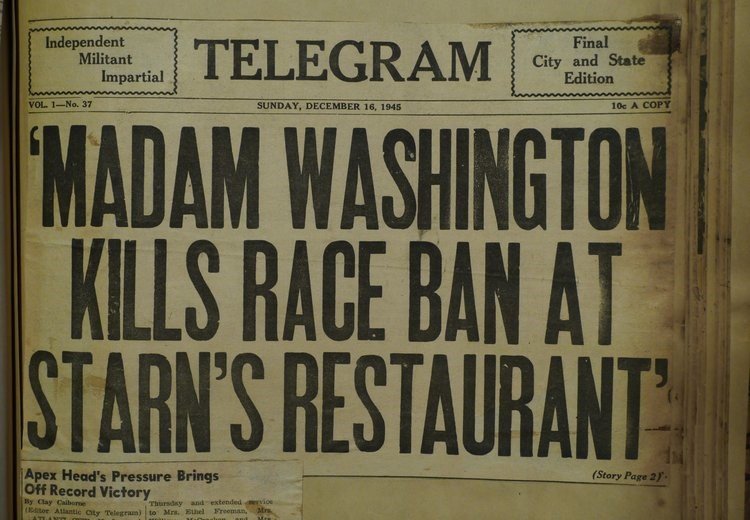Sara Spencer Washington of Atlantic City was a remarkable woman. Her efforts to improve the lives of blacks in America were every bit as important as those of civil rights icons like Rosa Parks. However, as with this area’s other forgotten hero, Richard Somers of Somers Point, the story of Sara Spencer Washington of Atlantic City is largely forgotten.

Sara Spencer Washington was born in 1889 in West Virginia, a state created by 25 counties that broke away from Virginia and the the Southern Confederacy during the Civil War.
After completing her local elementary school, Sara went to Lincoln Preparatory School in Philadelphia, and then to Norfolk Mission College in Virginia to become a school teacher. However, she left school to begin a dressmaking career at age 16.
In 1913, she moved to Atlantic City where she opened up a one room beauty parlor on Baltic Avenue at age 24.
Sara Spencer Washington was frustrated by the lack of cosmetics for African-American hair and skin. She enrolled in several advanced chemistry courses at Columbia University near Harlem in New York City to learn how to make them.
 For years, Sara developed, tested, and perfected a variety of beauty products suited for African American women. They included pressing oils, hot combs and pomades for hair and perfumes, beauty creams, and lipsticks.
For years, Sara developed, tested, and perfected a variety of beauty products suited for African American women. They included pressing oils, hot combs and pomades for hair and perfumes, beauty creams, and lipsticks.
In 1913, Atlantic City was already a popular convention and tourist destination. The fastest trains in the world brought millions of visitors to Atlantic City. Many were African Americans who discovered Madame Washington beauty shop and eagerly bought her products.
In 1919, shortly after World War One, Sara created the Apex News and Hair Company to produce and market her products nationwide. She built a new drugstore, laboratory, and offices at Indiana and Arctic Avenues.
Her newspaper, the Apex News was widely read in almost every black neighborhood in America. It did far more than promote Sara’s products. It also told stories and showed photos of blacks as smart, attractive, well-dressed, and financially successful Americans.
Within ten years Sara Spencer Washington’s company ran eleven beauty schools in the United States, with others in foreign countries to teach proper use of her products. Her company had roughly 500 employees in stores throughout the country, and roughly 45,000 part-time sales agents who worked from home.
Sara quickly became America’s first black, female millionaire.
Sara’s business thrived during the Great Depression. She inspired her employees with the slogan, Now is the time to plan your future by learning a depression-proof business.”
Before the Great Depression, most Americans turned to wealthy and successful people–not politicians– to help the poor, promote the arts, and improve society. Sara Spencer Washington, like most rich Americans since Benjamin Franklin, was one of them.
Besides giving blacks around the country skills, jobs, and confidence through her company, Sara Spencer Washington devoted her time, talent, and wealth helping those less fortunate, and winning respect and equal rights for black Americans.
When Atlantic City’s Easter Parade failed to recognize best dressed blacks on the Boardwalk, Sara Spencer Washington sponsored her own Easter Parade and gave out cash prizes the best dressed blacks on the Boardwalk with much publicity.
When beachfront hotels in Atlantic City refused to accept blacks, Sarah Spencer Washington bought the Brigantine Hotel for their use.? When local golf courses refused to accept blacks, Sarah Spencer Washington built her Apex Golf Course, now known as the Pomona golf course.

When Captain Starn’s Seafood Restaurant by the Atlantic City Inlet refused to admit blacks, Sara filed lawsuits and rented out the entire dining room for herself until the discrimination stopped.
When poor people in Atlantic City could not afford to heat their homes in the winter, Sara bought carloads of coal for them to pick up. She also hired airplanes to drop pre-paid coupons for needy people to pick up free coal.
Before 1936, blacks in America voted overwhelmingly for candidates of the Republican Party that fought to end slavery and give them equal voting rights.?? Since 1936, most blacks voted for candidates of the Democratic Party, which promised housing, jobs, and other benefits paid for by the government.
 Sarah Spencer Washington did not leave the Republican Party in 1936 like most blacks in America.
Sarah Spencer Washington did not leave the Republican Party in 1936 like most blacks in America.
She, like most blacks in Atlantic City until the 1960’s stayed with the Republican Party and were known as “Stand Patters”.
They continued to prefer self-improvement and economic independence — and vote Republican.
Sarah Spencer Washington was an active leader of the Republican Party at the national, state, and local level until the stroke that led to her death in 1953.
At a time when so many young Americans, especially blacks, have been programmed to lose faith in America, the story of Sara Spencer Washington is more important than ever.? It reminds us how America, in spite of its faults, was The Land of Boundless Opportunities for men and women with education, talent, and determination. It explains why blacks who came to Atlantic City in the 1920’s often called it “The New Promised Land”.
- We are a group of 150 ordinary citizens who mostly live near Atlantic City, New Jersey. We volunteer our time and money to maintain this website. We do our best to post accurate information. However, we have made mistakes. If you see any mistakes or inaccurate, misleading, outdated, or incomplete information in this or any of our posts, please let us know. We will do our best to correct the problem as soon as possible.
- Seth Grossman, Executive Director
- LibertyAndProsperity.com
- info@libertyandprosperity.com
- (609) 927-7333

